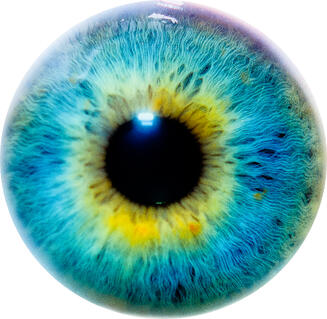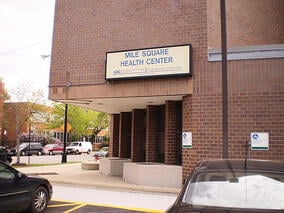At the University of Illinois at Chicago, biochemists have developed an intuitive solution to the age-old problem of macular degeneration, the leading cause of loss of vision for people over the age of fifty. Their new product is a light-sensitive molecule that can restore vision lost from degenerative eye diseases.
To fully appreciate this breakthrough, it’s important to understand the basic workings of the eye. The parts of our eye that are responsive to light are called photoreceptors. The two types of photoreceptors found in the retina are rods and cones, the former of which sees contrast in objects and the latter recognizes color, according to a GSU article. Based on the wavelengths of light they receive, the rods and cones transform themselves into specific shapes. Cells in the retina recognize these shapes and send corresponding signals to the brain, which constructs an image based on the information.

(Image courtesy of Wikimedia Commons and Thomas Tolkien)
In most degenerative eye diseases, including macular degeneration, the photoreceptors are killed prematurely or lose their usefulness and effectiveness due to age. With the photoreceptors no longer working at full capacity, the retinal cells send less precise signals to the brain, leading to poorer vision. However, the retinal cells themselves continue to function normally; it is only the photoreceptors that are affected.
With this in mind, the University of Illinois researchers came up with the idea of simply bypassing the photoreceptors entirely. UIC biochemists developed a molecule that can both bind to the retinal cells and transform based on incoming wavelengths. These innovative molecules respond to light much like the eye’s photoreceptors, and allow the cells in the retina to transmit the same visual information. The project leader, David Pepperberg, is a professor of ophthalmology and visual sceinces at the University of Illinois, Chicago. He explains the process in further detail in a UIC article, stating that “When the light-sensitive molecule is present and in active shape, it can bind to the receptor and help activate it.”
“Making the GABA receptors responsive to light is an important step toward the ultimate objective of being able to have the semblance of vision.”
Beyond restoring vision to those with degenerative eye diseases, Pepperberg believes this molecule may have applications in stopping epileptic seizures. The key to this is the fact that the molecule can transform in response to incoming light. Since epileptic seizures can be triggered by certain light patterns, researchers may be able to engineer molecules sensitive to those particular light patterns. When these patterns are received, the molecules can transform so that the retinal cells send signals that don’t trigger the epileptic response in the brain. Says Pepperberg:
“[I]ntroducing light of the appropriate wavelength into the region as the seizure begins and activating the GABA receptors could have the effect of turning off the seizure...This potentially could be a way of shutting down seizure activity as it’s starting."
 Projects like this one are sure to keep the University of Illinois at Chicago in the research spotlight. In addition to its research, UIC is physically improving: The groundbreaking ceremony for the new University of Illinois Hospital and Health Sciences System Mile Square Health Center (pictured left, courtesy of tigger.uic.edu) was held this week. The new health center is 46,000 square feet and will be able to provide medical attention to twice as many Chicago families as the previous structure. To learn more about the University of Illinois and its financial growth, we recommend reading the UIC funding report, below:
Projects like this one are sure to keep the University of Illinois at Chicago in the research spotlight. In addition to its research, UIC is physically improving: The groundbreaking ceremony for the new University of Illinois Hospital and Health Sciences System Mile Square Health Center (pictured left, courtesy of tigger.uic.edu) was held this week. The new health center is 46,000 square feet and will be able to provide medical attention to twice as many Chicago families as the previous structure. To learn more about the University of Illinois and its financial growth, we recommend reading the UIC funding report, below:
On May 2nd, 2013, Biotechnology Calendar, Inc. will hold its annual Chicago BioResearch Product Faire™ on the University of Illinois Chicago campus. Biotechnology Calendar produces top-class life science trade shows at research universities across the nation, and has been doing so for 20 years. To participate in next year’s show, please click the button below, or see our full 2013 schedule for more opportunities.



